李尔的“胡话诗”
2017-07-25王柏华
文/王柏华
李尔的“胡话诗”
文/王柏华1
有一种诗,既不追求意义或意境,也不试图抒情言志,一味沉溺于语言文字,在滑稽幽默的文字游戏和韵律中自得其乐。这一类诗往往通篇胡话,逻辑荒诞,又被称作“胡话诗”或“无意义诗”(Nonsense poems)。nonsense一词刚好可以一语双关地包含“无意义”和“胡话”这两层意思。
朗朗上口的语言游戏正是童谣或民谣的路数,因此,胡话诗的历史其实最为悠久,几乎算得上诗歌的正统。英语诗歌中的“胡话诗”相当丰富,喜欢写“胡话诗”的作家不胜枚举,中文读者最熟悉的是卡罗尔(Lewis Carroll,1832—1898),这位深居简出的数学家以《爱丽丝漫游奇境记》和《爱丽丝镜中奇遇记》二书闻名于世。爱丽丝故事妙语连珠,其中的妙诗也不少,皆为胡话诗,比如“矮胖子的朗诵”(Humpty Dumpty’s Recitation)、“白骑士之歌”(The White Knight’s Song)等。
比卡罗尔年代稍早,在十九世纪的英国还有一位幽默风趣、多才多艺的先生,爱德华·李尔(Edward Lear,1812—1888)。他喜欢旅游,会玩音乐,还会画画,尤其擅长画鸟兽。一天,他闲来无事,写起了“五行打油诗”(limerick),还随手配了插图。比如这两首:
There was an Old Man with a beard,
Who said, ‘It is just as I feared!
Two Owls and a Hen,
Four Larks and a Wren,
Have all built their nests in my beard!’
There was a Young Lady of Portugal,
Whose ideas were excessively nautical:
She climbed up a tree,
To examine the sea,
But declared she would never leave Portugal.
The Pobble Who Has No Toes
I The Pobble who has no toes
Had once as many as we;
When they said, ‘Some day you may lose
them all;’—
He replied, —‘Fish fi ddle de-dee!’And his Aunt Jobiska made him drink,Lavender water tinged with pink,
For she said, ‘The World in general knows There’s nothing so good for a Pobble’s toes!’
II The Pobble who has no toes,
Swam across the Bristol Channel;
But before he set out he wrapped his nose,
In a piece of scarlet fl annel.
For his Aunt Jobiska said, ‘No harm
‘Can come to his toes if his nose is warm;
‘And it’s perfectly known that a Pobble’s toes‘Are safe, —provided he minds his nose.’
III The Pobble swam fast and well
And when boats or ships came near him
有个老头儿胡子一大把,
他说“这件事让我担惊受怕:
一对猫头鹰和一只小鹪鹩,
一只大母鸡和四只百灵鸟,
在我胡子里搭了鸟窝,哎呀呀!”
一个葡萄牙女人真稀奇,
满脑子都是航海主意:
她爬上一棵树,
观察大海的远处,
却发誓绝不离开葡萄牙土地。
这样的童趣诗想必写起来既轻松又快乐(我和女儿美诺在翻译中也享受了同样的快乐)。李尔越写越上瘾,从此一发不可收拾,后来竟合成一部诗集,名叫《胡话诗集》或《荒诞书》。没想到,诗集1846年正式出版之后,大受欢迎,以至家喻户晓,老少咸宜,吸引了一代代读者,甚至被各种文学批评大家列入英国诗歌经典。
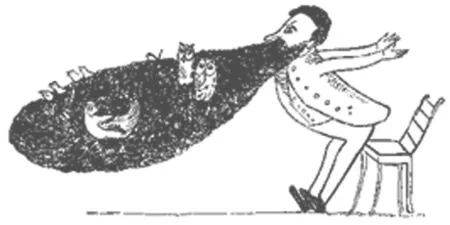
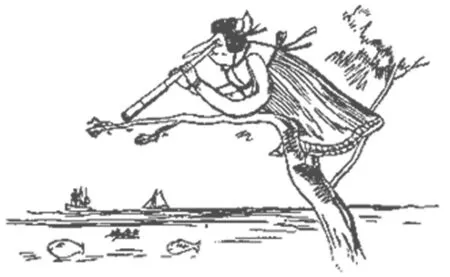
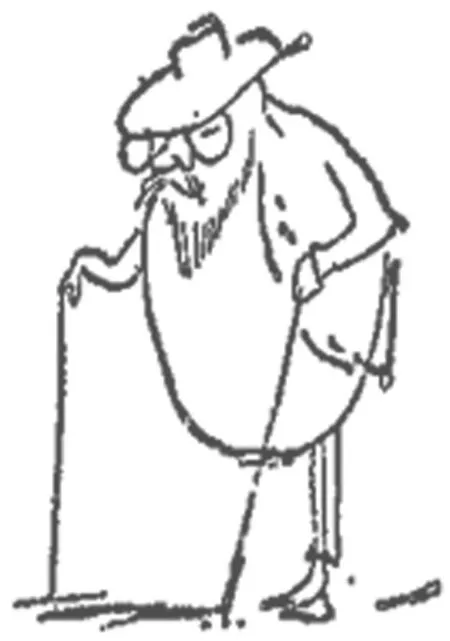
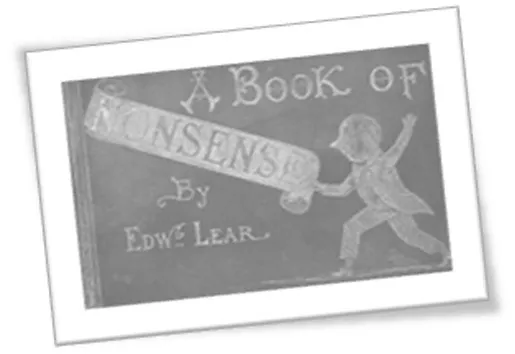
“五行打油诗”采用aabba式韵脚,中间两行稍短,读起来节奏分明,错落有致。诗中的文字游戏和幽默一读便知,而且一定要大声朗读,因为一切荒唐和无厘头的妙趣都在音韵节奏中,非朗读不可。
让我们再读一首长一点的、更好玩的《泡伯没有脚趾头》,选自《胡话诗》第四集(1877年):
The Pobble Who Has No Toes
I The Pobble who has no toes
Had once as many as we;
When they said, ‘Some day you may lose
them all;’—
He replied, —‘Fish fi ddle de-dee!’And his Aunt Jobiska made him drink,Lavender water tinged with pink,
For she said, ‘The World in general knows There’s nothing so good for a Pobble’s toes!’
II The Pobble who has no toes,
Swam across the Bristol Channel;
But before he set out he wrapped his nose,
In a piece of scarlet fl annel.
For his Aunt Jobiska said, ‘No harm
‘Can come to his toes if his nose is warm;
‘And it’s perfectly known that a Pobble’s toes‘Are safe, —provided he minds his nose.’
III The Pobble swam fast and well
And when boats or ships came near him
So that all the world could hear him.And all the Sailors and Admirals cried,
When they saw him nearing the further side,—
‘He has gone to fi sh, for his Aunt Jobiska’s‘Runcible Cat with crimson whiskers!’
IV But before he touched the shore,
The shore of the Bristol Channel,A sea-green Porpoise carried away
His wrapper of scarlet fl annel.And when he came to observe his feet Formerly garnished with toes so neat His face at once became forlorn
On perceiving that all his toes were gone!
V And nobody ever knew
From that dark day to the present,Whoso had taken the Pobble’s toes,
In a manner so far from pleasant.Whether the shrimps or craw fi sh gray,Or crafty Mermaids stole them away—Nobody knew; and nobody knows
How the Pebble was robbed of his twice fi ve
toes!
VI The Pobble who has no toes
Was placed in a friendly Bark,
And she made him a feast at his earnest wish
Of eggs and buttercups fried with fi sh;—
And she said,—‘It’s a fact the whole world knows,
‘That Pebbles are happier without their toes.’
泡伯没有脚趾头
(一)
泡伯没有脚趾头
可从前跟我们的一样多;
有人说:“它们会丢得一个不留;”他回答说:“无厘头无厘头,胡说!”
他的阿姨乔布斯卡给他喝
薰衣草花水配上石竹花朵;她说:“全世界谁不知道
这对泡伯的脚趾头再好不过!”
(二)
从前泡伯长着脚趾头,他游过海峡布里斯托;
出发前先把鼻子包起来,用深红色法兰绒小布兜。
因为他的阿姨乔布斯卡说:“没有什么
能伤害他的脚趾头,只要他鼻子暖暖和和;
众所周知,泡伯的脚趾头当然不会丢,只要他照顾好他的小鼻头。”
(三)
泡伯游得漂亮又起劲,遇到任何船只太靠近,He tinkedly-binkledy-winkled a bell
他就摇起他的铃铛叮铃铃
保证全世界谁也不会听不清。水手和军官个个都掉眼泪,
望着他快游到对岸的小后背——
“他去捕鱼,为阿姨乔布斯卡那只深红胡须的猫,长着三叉嘴!”(四)
可就在他马上游到头,
布里斯托海峡蓝幽幽,
一只海绿色的鼠海豚拿走了他鼻子上的法兰绒小布兜。他低头朝自己的脚上瞧,
满面愁容伤心得不得了,
从前漂亮整齐的脚指头,
突然间,全都不见了!(五)
没有谁能说出来,
从那黑暗的一天到现在,
到底是谁偷走了泡伯的脚趾头,
那偷窃的手法令人郁闷又奇怪。
是小虾米还是灰色的小龙虾,或是那美人鱼神秘又狡猾,
当时无人知,现在也无人晓
那十个脚趾头如何被抢走了!(六)
泡伯的脚趾头没有了,
快把他放进舒服的树皮筏;And they rowed him back, and carried him up,To his Aunt Jobiska’s Park.
树皮筏划啊划,送泡伯回家,交给阿姨乔布斯卡。
阿姨为他做大餐,全依他心愿,
毛茛花和小鱼跟鸡蛋来煎一煎;
她说:“普天之下谁不知道,没有脚趾头,泡伯快乐无边。”
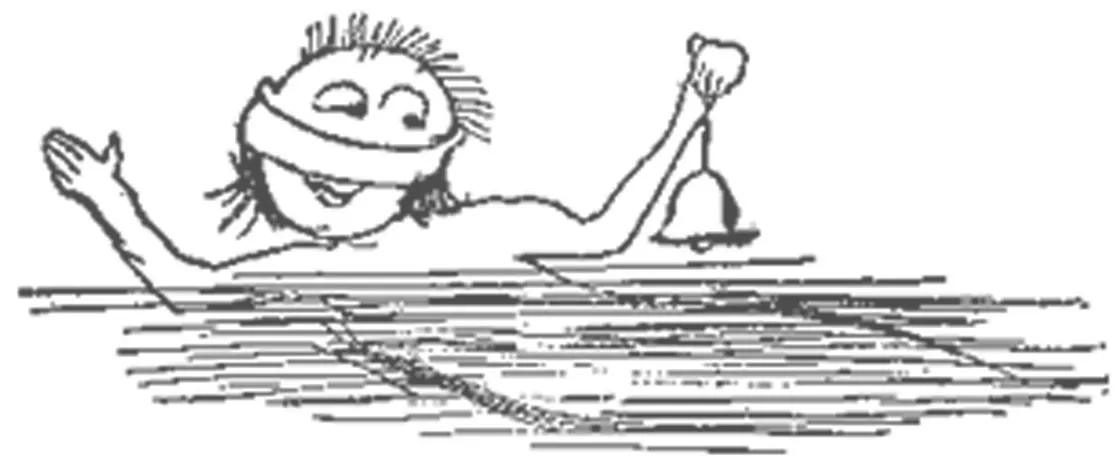
不过,至于诗歌的意义是什么,奉劝一头雾水的读者千万不要细想:脚趾头和小鼻头有什么关系呢?泡伯的阿姨乔布斯卡凭什么说:“泡伯的脚趾头当然不会丢,只要他照顾好他的小鼻头。”她凭什么说这是“众所周知”的呢?我怎么就不知道呢?还有,到底是谁偷走了泡伯的脚趾头呢?而且,泡伯究竟是谁呢?是人还是小妖怪?或许答案就在声音里,声音就是逻辑,声音就是意义!所以,不妨请你把诗中的几个关键词——Pobble、toe、nose,再大声读一读,连起来读,就全明白了。
为了在译文中复制原诗的音乐效果,译者尝试动用各种谐音字,“泡伯”“脚趾头”“小鼻头”“小布兜”,等等。为了传达原诗的节奏感和幽默感,在无法对译的情况下,译者也适当调整了句式和字词,比如Fish fi ddle de-dee译作“无厘头”,在不得已时,还添加了个别词语,比如“蓝幽幽”。总之,希望读者无论读英文还是中文,即使不是笑出声来,至少也要会心微笑。毕竟,胡话诗就是为了引人发笑的。
不过呢,“胡话诗”把玩文字和声音,一任天真,且音乐感极强,容易记诵,倒不失为学习和亲近语言的最佳途径,为日后成为一个敏感的读者和作家打下良好基础。或许不经意之间,你已然经由“胡话”进入语词的密林深处,有时跌跌撞撞,有时曲径通幽,有时腾空飞跃。 □
1“复旦大学文学翻译工作坊·奇境译坊”主持人。发表译著多部。近年来主攻英美诗歌,主编“北极光诗歌译丛”“童诗金库”“世界诗歌批评本”等。本文中的诗歌均由王柏华及其女儿周天美诺(11岁,就读复旦附属小学五年级)共同翻译。
